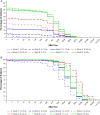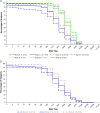Influence of Age on Antibody Response and Persistence Following Immunization With MenAfriVac
- PMID: 26553685
- PMCID: PMC4639503
- DOI: 10.1093/cid/civ601
Influence of Age on Antibody Response and Persistence Following Immunization With MenAfriVac
Abstract
Background: A meningococcal group A conjugate vaccine, PsA-TT (MenAfriVac), developed through the Meningitis Vaccine Project and manufactured by the Serum Institute of India, Ltd, was tested in multiple clinical trials conducted mainly in Africa. The impact of age at which subjects were vaccinated on immune response and persistence postimmunization with PsA-TT was the main focus of the current analysis.
Methods: Subjects who were vaccinated with a single dose of 10 µg of PsA-TT at 12-23 months or 22-33 months of age in study A conducted in Mali and The Gambia; at 2-10 years, 11-17 years, or 18-29 years of age in study B conducted in Mali, The Gambia, and Senegal; and at 14-18 weeks, 9-12 months, or 12-18 months of age in study C conducted in Ghana are included in the current analysis. Immunogenicity was measured by group A serum bactericidal antibody (SBA) titer with baby rabbit complement.
Results: Significant differences in SBA titers were found among the age groups in studies B and C both 28 days and 1 year postimmunization. A significant difference in SBA titers between age groups 12-23 months and 22-33 months was only observed 1 year postimmunization in study A. Antibody titers remained at similar levels from 1 to 2 years postimmunization for subjects vaccinated at 12-23 months in study A and at 9-12 months or 12-18 months of age in study C.
Conclusions: Subjects immunized at different ages had different postimmunization immune responses as measured by SBA titers. Toddlers tended to have higher immune responses than infants. This pattern persisted at least 1 year postimmunization.
Clinical trials registration: ISRCTN78147026 (study A), ISRCTN87739946 (study B), and ISRCTN82484612 (study C).
Keywords: MenAfriVac; age; meningococcal group A conjugate vaccine; serum bactericidal antibody.
© The Author 2015. Published by Oxford University Press on behalf of the Infectious Diseases Society of America.
Figures
Similar articles
-
Antibody Persistence at 1 and 4 Years Following a Single Dose of MenAfriVac or Quadrivalent Polysaccharide Vaccine in Healthy Subjects Aged 2-29 Years.Clin Infect Dis. 2015 Nov 15;61 Suppl 5(Suppl 5):S521-30. doi: 10.1093/cid/civ518. Clin Infect Dis. 2015. PMID: 26553684 Free PMC article. Clinical Trial.
-
Antibody kinetics following vaccination with MenAfriVac: an analysis of serological data from randomised trials.Lancet Infect Dis. 2019 Mar;19(3):327-336. doi: 10.1016/S1473-3099(18)30674-1. Epub 2019 Feb 10. Lancet Infect Dis. 2019. PMID: 30745277
-
Antibody Persistence 1-5 Years Following Vaccination With MenAfriVac in African Children Vaccinated at 12-23 Months of Age.Clin Infect Dis. 2015 Nov 15;61 Suppl 5(Suppl 5):S514-20. doi: 10.1093/cid/civ672. Clin Infect Dis. 2015. PMID: 26553683 Free PMC article. Clinical Trial.
-
Antibody persistence following meningococcal ACWY conjugate vaccine licensed in the European Union by age group and vaccine.Expert Rev Vaccines. 2020 Aug;19(8):745-754. doi: 10.1080/14760584.2020.1800460. Epub 2020 Sep 8. Expert Rev Vaccines. 2020. PMID: 32897762 Review.
-
Is a single infant priming dose of meningococcal serogroup C conjugate vaccine in the United Kingdom sufficient?Hum Vaccin Immunother. 2015;11(6):1501-6. doi: 10.1080/21645515.2015.1019189. Hum Vaccin Immunother. 2015. PMID: 25912095 Free PMC article. Review.
Cited by
-
Modeling protective meningococcal antibody responses and factors influencing antibody persistence following vaccination with MenAfriVac using machine learning.PLoS One. 2025 May 14;20(5):e0323384. doi: 10.1371/journal.pone.0323384. eCollection 2025. PLoS One. 2025. PMID: 40367245 Free PMC article.
-
Systematic analysis of infectious disease outcomes by age shows lowest severity in school-age children.Sci Data. 2020 Oct 15;7(1):329. doi: 10.1038/s41597-020-00668-y. Sci Data. 2020. PMID: 33057040 Free PMC article.
References
-
- Molesworth AM, Thomson MC, Connor SJ et al. . Where is the meningitis belt? Defining an area at risk of epidemic meningitis in Africa. Trans R Soc Trop Med Hyg 2002; 96:242–9. - PubMed
-
- LaForce FM, Konde K, Viviani S, Préziosi MP. The Meningitis Vaccine Project. Vaccine 2007; 25(suppl 1):A97–100. - PubMed
-
- World Health Organization. Meningococcal vaccines: WHO position paper, November 2011. Wkly Epidemiol Rec 2011; 86:521–40. - PubMed
-
- Sow SO, Okoko BJ, Diallo A et al. . Immunogenicity and safety of a meningococcal A conjugate vaccine in Africans. N Engl J Med 2011; 364:2293–304. - PubMed
MeSH terms
Substances
Associated data
Grants and funding
LinkOut - more resources
Full Text Sources
Other Literature Sources
Research Materials
Miscellaneous



